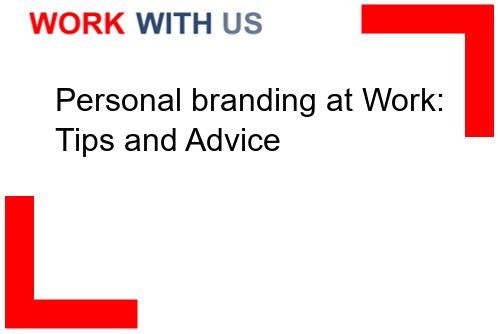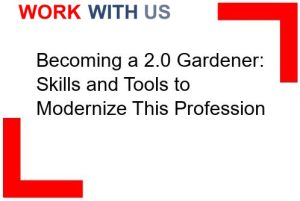In today’s competitive job market, personal branding has become increasingly important for professionals looking to stand out and advance in their careers. Personal branding is the practice of marketing oneself and one’s career as a brand, with the goal of creating a unique and memorable impression on others. This can be especially crucial in the workplace, where individuals are constantly vying for promotions, raises, and recognition.
One of the key aspects of personal branding at work is establishing a strong online presence. In today’s digital age, employers and colleagues often turn to the internet to learn more about potential hires or coworkers. Therefore, it is essential for professionals to carefully curate their online profiles to reflect their personal brand. This can include updating LinkedIn profiles with relevant work experience, skills, and accomplishments, as well as engaging with industry-related content on social media platforms.
In addition to maintaining a strong online presence, professionals should also focus on developing a consistent personal brand across all aspects of their professional lives. This includes everything from the way they dress and communicate to the projects they choose to work on and the relationships they cultivate with colleagues. By consistently presenting themselves in a way that aligns with their personal brand, professionals can build credibility and trust with others in the workplace.
Another important aspect of personal branding at work is showcasing one’s unique skills and strengths. Professionals should take the time to identify their key strengths and find ways to leverage them in their day-to-day work. This can involve seeking out opportunities to take on projects that align with their strengths, as well as actively promoting their accomplishments to colleagues and supervisors. By highlighting what sets them apart from others, professionals can position themselves as valuable assets to their organizations.
Networking is also a crucial component of personal branding at work. Building relationships with colleagues, mentors, and industry professionals can open up new opportunities for career advancement and growth. Professionals should make an effort to attend industry events, join professional organizations, and participate in networking groups to expand their professional network. By cultivating strong relationships with others in their field, professionals can increase their visibility and credibility in the workplace.
Finally, professionals should continuously seek feedback and self-reflect on their personal branding efforts. It is important to regularly assess how one is perceived by others in the workplace and make adjustments as needed to ensure that their personal brand is effectively communicated. By soliciting feedback from colleagues and supervisors, professionals can gain valuable insights into how they are perceived and identify areas for improvement.
In conclusion, personal branding at work is a critical component of career success in today’s competitive job market. By establishing a strong online presence, developing a consistent personal brand, showcasing unique skills and strengths, networking effectively, and seeking feedback, professionals can position themselves for advancement and growth in their careers. By taking the time to invest in their personal brand, professionals can differentiate themselves from their peers and create opportunities for success in the workplace.
Building a strong personal brand: strategies for success in the workplace
In today’s competitive job market, it is essential for individuals to establish a strong personal brand in order to stand out and succeed in the workplace. Building a personal brand involves creating a unique identity that showcases one’s skills, values, and personality. By developing a strong personal brand, individuals can enhance their professional reputation, attract opportunities, and advance their careers.
One key strategy for building a strong personal brand is to identify and leverage one’s strengths. This involves reflecting on one’s skills, experiences, and accomplishments to determine what sets them apart from others. By focusing on their strengths, individuals can position themselves as experts in their field and showcase their unique value to employers and colleagues.
Another important strategy for building a strong personal brand is to establish a consistent online presence. In today’s digital age, it is crucial for individuals to have a strong presence on social media and professional networking sites. By regularly sharing content related to their industry, engaging with others in their field, and showcasing their expertise, individuals can build a strong online reputation that aligns with their personal brand.
Networking is also a critical strategy for building a strong personal brand. By connecting with colleagues, mentors, and industry professionals, individuals can expand their professional network, gain valuable insights, and create opportunities for career advancement. Networking allows individuals to showcase their skills and expertise, build relationships with key stakeholders, and position themselves as valuable assets in their field.
In addition to networking, it is important for individuals to continuously seek out opportunities for growth and development. By pursuing additional training, certifications, or advanced degrees, individuals can enhance their skills, expand their knowledge, and stay current in their field. Continuous learning not only demonstrates a commitment to professional growth but also allows individuals to differentiate themselves from their peers and strengthen their personal brand.
Another effective strategy for building a strong personal brand is to seek out opportunities to showcase one’s expertise and leadership abilities. By volunteering for high-profile projects, speaking at industry events, or writing articles for professional publications, individuals can demonstrate their knowledge, skills, and passion for their work. These opportunities not only help individuals build credibility and visibility in their field but also position them as thought leaders and influencers in their industry.
It is also important for individuals to cultivate a positive and professional image in the workplace. By demonstrating strong work ethic, integrity, and professionalism, individuals can build trust and credibility with colleagues, supervisors, and clients. Maintaining a positive attitude, being a team player, and delivering high-quality work consistently can help individuals establish a reputation as a reliable and respected professional.
In conclusion, building a strong personal brand is essential for success in the workplace. By identifying and leveraging one’s strengths, establishing a consistent online presence, networking, pursuing growth opportunities, showcasing expertise and leadership abilities, and cultivating a positive image, individuals can create a unique identity that sets them apart and positions them for success. Building a strong personal brandstrong> requires dedication, effort, and a commitment to continuous improvement, but the rewards – including increased visibility, credibility, and career opportunities – are well worth the investment.
Navigating the fine line between authenticity and professionalism in personal branding
n be a challenging task for individuals looking to establish a strong online presence. In today’s digital age, personal branding has become increasingly important as it can help individuals stand out in a competitive job market or attract potential clients for their business. However, striking the right balance between authenticity and professionalism is crucial to ensure that one’s personal brand is both relatable and credible.
Authenticity is key in personal branding as it allows individuals to showcase their true selves and connect with their audience on a deeper level. When individuals are authentic in their personal branding efforts, they are able to build trust and credibility with their audience, which can ultimately lead to stronger relationships and increased opportunities. Authenticity involves being genuine, transparent, and true to oneself in all aspects of one’s personal brand. This means sharing personal stories, values, and beliefs that resonate with one’s audience and showcase the unique qualities that set them apart from others. Authenticity is what makes a personal brand memorable and compelling to others.
On the other hand, professionalism is also important in personal branding as it helps individuals establish themselves as credible and trustworthy in their respective fields. Professionalism involves presenting oneself in a polished and competent manner, adhering to industry standards and best practices, and maintaining a level of consistency and reliability in one’s personal brand. Professionalism can help individuals command respect and authority in their field, attract high-quality opportunities, and build a strong reputation that sets them apart from their competitors. Striking the right balance between authenticity and professionalism is essential to ensure that one’s personal brand is both engaging and credible to their target audience.
One way to navigate the fine line between authenticity and professionalism in personal branding is to define one’s personal brand values and mission statement. By clearly articulating what one stands for and what they aim to achieve through their personal brand, individuals can ensure that their branding efforts are aligned with their core beliefs and goals. This can help individuals stay true to themselves while also presenting a professional image that resonates with their audience. Additionally, defining one’s personal brand values can serve as a guide for making decisions about what content to share, how to engage with their audience, and which opportunities to pursue.
Another strategy for balancing authenticity and professionalism in personal branding is to curate one’s online presence carefully. This involves being mindful of the content that one shares on social media, personal websites, and other online platforms to ensure that it aligns with one’s personal brand values and goals. Individuals should consider how their online presence reflects their authenticity and professionalism, and make adjustments as needed to maintain a consistent and cohesive personal brand. This may involve showcasing personal interests and hobbies that are relevant to one’s brand, sharing behind-the-scenes glimpses of one’s work or creative process, and engaging authentically with followers and fans.
In conclusion, requires individuals to strike a delicate balance between showcasing their true selves and presenting a polished image to their audience. By defining one’s personal brand values, curating their online presence carefully, and staying true to themselves in all aspects of their personal brand, individuals can create a compelling and credible personal brand that resonates with their target audience. Ultimately, finding the right balance between authenticity and professionalism can help individuals stand out in a crowded digital landscape and attract the opportunities and connections they desire.
Utilizing social media to enhance your personal brand in the workplace
In today’s digital age, establishing a strong personal brand is essential for professional success. Social media platforms have become powerful tools for individuals to showcase their skills, expertise, and personality to a wide audience. By strategically utilizing social media, individuals can enhance their personal brand in the workplace and stand out among their peers.
One of the key benefits of using social media to enhance your personal brand is the ability to showcase your professional accomplishments and expertise. Platforms like LinkedIn allow individuals to create a detailed profile highlighting their skills, experience, and achievements. By regularly updating your profile with new accomplishments, certifications, and projects, you can demonstrate your expertise and credibility to potential employers and colleagues.
In addition to showcasing your professional accomplishments, social media can also be used to demonstrate your personality and values. Sharing personal anecdotes, hobbies, and interests on platforms like Twitter and Instagram can help humanize your brand and make you more relatable to others. By sharing content that reflects your values and beliefs, you can attract like-minded individuals and build a strong network of supporters in the workplace.
Another benefit of utilizing social media to enhance your personal brand is the opportunity to engage with industry influencers and thought leaders. By following and interacting with key figures in your field, you can stay up-to-date on industry trends, gain valuable insights, and build relationships with influential individuals. Engaging with industry influencers can also help increase your visibility and credibility within your industry.
Furthermore, social media can be a powerful tool for networking and building relationships with colleagues and potential employers. Platforms like LinkedIn and Twitter allow individuals to connect with professionals in their industry, join relevant groups and communities, and participate in discussions and events. By actively engaging with others on social media, you can expand your network, build relationships, and create opportunities for collaboration and career advancement.
In addition to networking and relationship-building, social media can also be used to showcase your creativity and innovation. Platforms like Instagram and Pinterest provide a visual medium for individuals to share their creative projects, designs, and ideas. By showcasing your creative work on social media, you can demonstrate your unique skills and talents to a wider audience and differentiate yourself from others in the workplace.
Moreover, social media can be a valuable tool for personal branding in the workplace by providing a platform for thought leadership and content creation. Platforms like LinkedIn Pulse and Medium allow individuals to publish articles, blog posts, and thought pieces on topics relevant to their industry. By sharing valuable insights and expertise through content creation, you can position yourself as a thought leader in your field and attract attention from potential employers and collaborators.
Additionally, social media can be used to build a personal brand that reflects your values and passions. By sharing content that aligns with your values and interests, you can attract like-minded individuals and create a strong personal brand that resonates with others. Whether you are passionate about sustainability, diversity, or innovation, social media provides a platform to showcase your values and connect with others who share your passions.
In conclusion, can have numerous benefits for your professional success. By strategically showcasing your accomplishments, personality, expertise, and values on social media platforms, you can differentiate yourself from others, build relationships with industry influencers, expand your network, showcase your creativity, establish yourself as a thought leader, and attract opportunities for career advancement. In today’s competitive job market, a strong personal brand can be a powerful asset that sets you apart and helps you achieve your professional goals.
Overcoming challenges and pitfalls in personal branding at work: lessons learned from real-life examples
Personal branding at work is crucial for professionals looking to advance in their careers. It involves creating a strong and consistent image that reflects one’s skills, values, and personality. However, building a successful personal brand can be challenging, as there are many pitfalls that individuals may encounter along the way. By learning from real-life examples of individuals who have overcome these challenges, one can gain valuable insights into how to navigate the complexities of personal branding in the workplace.
One common challenge in personal branding is maintaining authenticity while also presenting a polished image. This was a dilemma faced by Sarah, a marketing executive who struggled to balance her professional persona with her true self. Sarah realized that in order to build a strong personal brand, she needed to be genuine and transparent with her colleagues and clients. By sharing her personal experiences and values, Sarah was able to connect with others on a deeper level and establish trust. Through this approach, Sarah was able to overcome the pitfall of appearing inauthentic and instead, built a personal brand that was both professional and relatable.
Another challenge in personal branding is staying consistent across different platforms and interactions. This was a hurdle that Alex, a sales manager, faced when he found that his online presence did not align with his in-person interactions. Alex learned that in order to build a cohesive personal brand, he needed to ensure that his messaging and image were consistent across all channels. By updating his social media profiles, refining his elevator pitch, and aligning his personal values with his professional goals, Alex was able to overcome this challenge and present a unified brand to his colleagues and clients.
One of the most common pitfalls in personal branding is failing to adapt to changing circumstances. This was a lesson learned by Maria, a project manager, who struggled to maintain her personal brand when she was promoted to a leadership role. Maria realized that in order to succeed in her new position, she needed to evolve her personal brand to reflect her new responsibilities and goals. By seeking feedback from mentors, attending leadership training programs, and networking with other leaders in her industry, Maria was able to adapt her personal brand and thrive in her new role.
Another challenge in personal branding is overcoming negative perceptions or stereotypes. This was a hurdle that James, a software engineer, faced when he was labeled as introverted and unapproachable by his colleagues. James knew that in order to advance in his career, he needed to change these perceptions and showcase his strengths as a team player and problem solver. By volunteering for cross-functional projects, participating in team-building activities, and seeking feedback from his peers, James was able to overcome these negative stereotypes and build a personal brand that highlighted his skills and contributions.
One final challenge in personal branding is managing a work-life balance. This was a struggle for Emily, a human resources manager, who found it difficult to separate her personal and professional identities. Emily realized that in order to build a successful personal brand, she needed to set boundaries and prioritize self-care. By establishing a routine, practicing mindfulness, and seeking support from her colleagues and friends, Emily was able to overcome this challenge and create a personal brand that reflected her values and well-being.
In conclusion, personal branding at work is a complex and ongoing process that requires individuals to navigate various challenges and pitfalls. By learning from real-life examples of individuals who have overcome these obstacles, one can gain valuable insights into how to build a strong and authentic personal brand. From maintaining authenticity to adapting to changing circumstances, overcoming negative perceptions, and managing a work-life balance, there are many lessons to be learned from those who have successfully navigated the complexities of personal branding in the workplace. By applying these lessons to their own professional journeys, individuals can build a personal brand that reflects their unique skills, values, and aspirations.



